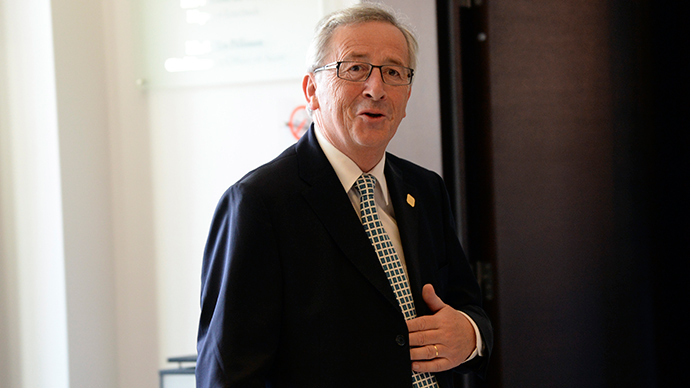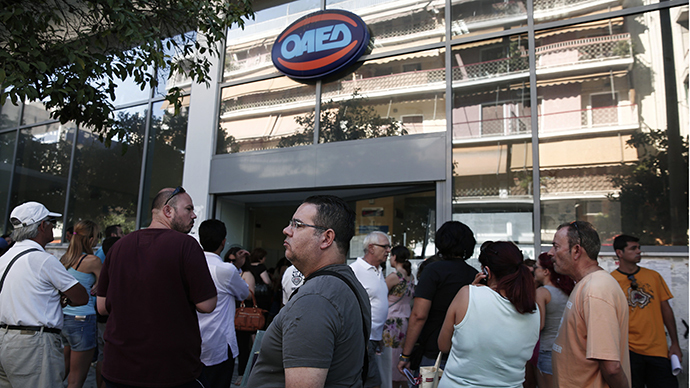Germany’s trade surplus: Feeding euro crisis

President-elect of the European Commission Jean-Claude Juncker needs to bite the hand which fed him high office by fining Germany for economic achievements.
Lest you have forgotten the euro crisis, the next chapter is about to play out. That is not to say the previous chapters have been concluded. Far from it! This is not a purely sequential process. Rather the euro remains a multilateral reign of terror for millions of citizens and their economies locked in a nightmare spiral of debt, decay and unemployment fuelled by the deranged political hubris of Europhile economic illiterates.
The next phase of Eurocrisis has been created by German export success which is hampering recovery in Mediterranean nations, locked in different stages of long-term economic downturn driven by a heady cocktail of political denial, leadership failure and generally spendthrift government mixed in with adherence to the design flaws of the euro currency itself.
For the 18 economically disparate nations in the single currency melting pot, a key element of economic rebalancing (currency revaluation) is no longer available. This is causing ever greater crisis as Germany has been able to steam its economy ahead with remarkable gusto.
In times past if German engineering was selling with gusto and, say, French products couldn’t cope, eventually the ‘invisible hand’ of the marketplace helped rebalance affairs: pushing the German currency up and letting the French one fall. Cheaper products gained market share and the cycle advanced. Nowadays that can’t happen. Rather, Germany is exporting with relish at an artificially low exchange rate as the euro’s value reflects all 18 nations, including Mediterranean basket cases.
This is a potential death spiral. As Germany exports ever more at a better currency rate than if they had their own currency (at least 5-15 percent better according to the IMF), other nations are increasingly constrained by a currency rate which renders them uncompetitive.
This sorry state of affairs leaves a lot of questions about the state of mind of the Eurocrats who created the euro in the first place. However, as always in unaccountable plutocracies, they have been punished only with gilded tax-free pensions… unlike the many citizens their folly has impoverished.

Meanwhile, within the ranks of the Brussels blob, some bright sparks have created rules to counteract this very situation. As always with an EU which delivers ‘more’ (‘more Europe’,‘more regulations’, ‘more economic damage’, ‘more unemployment’ etc.) Brussels is proposing fines for nations which export too much, endangering the economic well-being of other eurozone members. This all sounds like a mightily brilliant idea, until you apply a spot of thought to the situation (which one might add sounds like the euro currency’s flawed design itself).
First up is the issue of actually demanding Germany atone for… er, well, er… you know, employing lots of its citizens. (One eurozone member has half the average of eurozone unemployment. Can you guess which?) By selling lots of stuff overseas, Germany is rich, powerful and prosperous. So let’s rewind that argument: the EU is going to say, “Now look here Berlin, you can’t just, well you know, trade as you wish and sell things all over the place and have people fully employed! You have to think of the others!”
To which I suspect Chancellor Merkel will swing her handbag with the feral gusto which was briefly displayed last year when somebody had the temerity to suggest she curtail her exporting just a teeny bit to help the eurozone rump sell at least one more widget to China.
Nevertheless, it is within the powers of the Commission President to demand sanctions against Germany including cash fines, until they reduce their trade surplus to below 6 percent from the current 7 percent headline rate. However, that is going to be tricky. Apart from the danger of Merkel reflecting some of the fiercer creatures lurking in Berlin’s zoological gardens a brisk walk from the Bundestag, there is the ugly hand of political favor which often damns objectivity within the EU. After all, it was Frau Merkel whose support proved decisive in settling Jean-Claude Juncker into his new EU position. Can we really expect that the commission president will now turn round and bite the hand which anointed him to high office?
Juncker finds himself in an invidious position. Without remedial action the euro will destroy Mediterranean economies. However Germany is hardly about to abandon the implicit competitive advantage delivered by the bungled euro currency. The ultimately casualty will be the euro, if not the entire EU.
The statements, views and opinions expressed in this column are solely those of the author and do not necessarily represent those of RT.
The statements, views and opinions expressed in this column are solely those of the author and do not necessarily represent those of RT.













